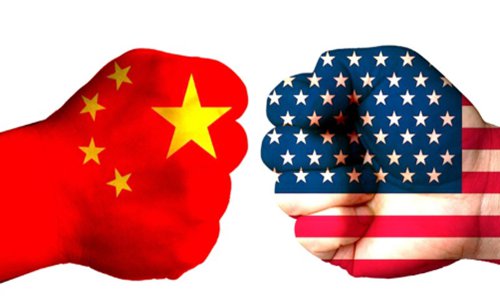HOME >> OPINION
China won't play victim role amid US tariff hikes
Source:Global Times Published: 2019/8/6 7:55:17

Photo:VCG
China announced it was considering levying additional temporary tariffs on US agricultural imports on all agreements made after August 3. Meanwhile, Chinese companies have suspended purchasing US agricultural products. The decision was made following the US move to slap an additional 10 percent in tariffs on $300 billion worth of Chinese goods last week.
The announcement from Beijing send a clear message to Washington that their latest action was unacceptable, and that China will not hesitate to take necessary countermeasures should the US follow through on the tariff hikes.
The US government claimed the added tariffs would be implemented on September 1, as thorough negotiations were scheduled with both delegations in August. It is precisely this unilateral reversal strategy by the US that has had a severe impact on trade negotiations.
US stocks plummeted last Thursday after the US government announced it would continue its trade war with China. On Monday, US stocks fell again at the opening bell over trade tension concerns between the two economic powers. The weak stock market performance served as an indication that the trade war has spared no mercy for the US economy. The only outcome is a lose-lose scenario and falls by the basic fundamentals of economics, and the US government will not be an exception to this principle.
China would like to reach a trade agreement, but this does not mean it is timid. Such a goal is centered on the goodwill and the inherent responsibility that it holds to protect the well-being of others through continuous cooperation with the US. Yet at the same time, when Washington increases tariffs, China will take necessary countermeasures, which should come as no surprise. China has always utilized a rational approach when responding by purposefully limiting its power. Under the latest circumstances, China suspended US agricultural purchases. The move is a typical tit-for-tat action.
If the US incurred an enormous deficit from trade with China, then large-scale Sino-US economic and trade cooperation could not exist. Previous White House administrations were not foolish, neither were US importers and exporters. However, tightening the screws on bilateral trade is the worst possible solution. American farmers have adequate production facilities and plenty of land, but more importantly, they have China with its expanding market demand. Unfortunately, the Trump administration's China watchdog group is not on the right track. The US should take greater responsibility for the development of Sino-US trade.
The US government needs to stop fantasizing about a China surrender brought on by extreme pressure. To establish a trade relationship conducive for a win-win result, both sides must consider each other's concerns when conducting negotiations in a frank and honest manner.
Unilateralism has been a total strategy failure. How could something like that become a "rule" between China and the US? It would only create further losses for both sides and prevent them from reaching any mutual agreements.
It is misleading and naive for the US to downplay its losses from the trade war while praising China's sufferings. It is also a shame how the US government deceives its people. Calculating the exact amount of damages incurred by both sides would be impossible. It will ultimately test economic endurance and the strength of both political systems. China's stamina and endurance will allow the country to prevail throughout the trade war.
After a few rounds of trade negotiations, both sides must have gotten to know each other well. They shouldn't rely on a miracle or an ace in the hole to emerge as a winner, and they need to understand that pursuing a complete victory is unreasonable. Otherwise, it would be a waste of time and public sentiment. Furthermore, US uncertainty is harmful to potential investors.
It seems that many acres of US farmland will not be put to use. Challenging times lie ahead for at least a few Chinese and US businesses. It will depend on the US whether they want to resolve deadlocked trade negotiations before Sino-US relations incur further damage. Although Washington imposed new tariffs, the aim was not to sabotage trade relations. However, Trump's capricious administration could push things too far, which would lead to severe consequences the US never anticipated.
When the Chinese government announced it would suspend purchases of US agricultural products, the word "suspend" was used to indicate how there is room for both parties to reach a solution. It also means the suspension will last until the US adopts a better attitude. This is one of the many soft tools that China has. Although not aggressive, China will stand firm as a nail on their position. The US, now more than ever, should reassess its China strategy.
RELATED ARTICLES:
Posted in: EDITORIAL